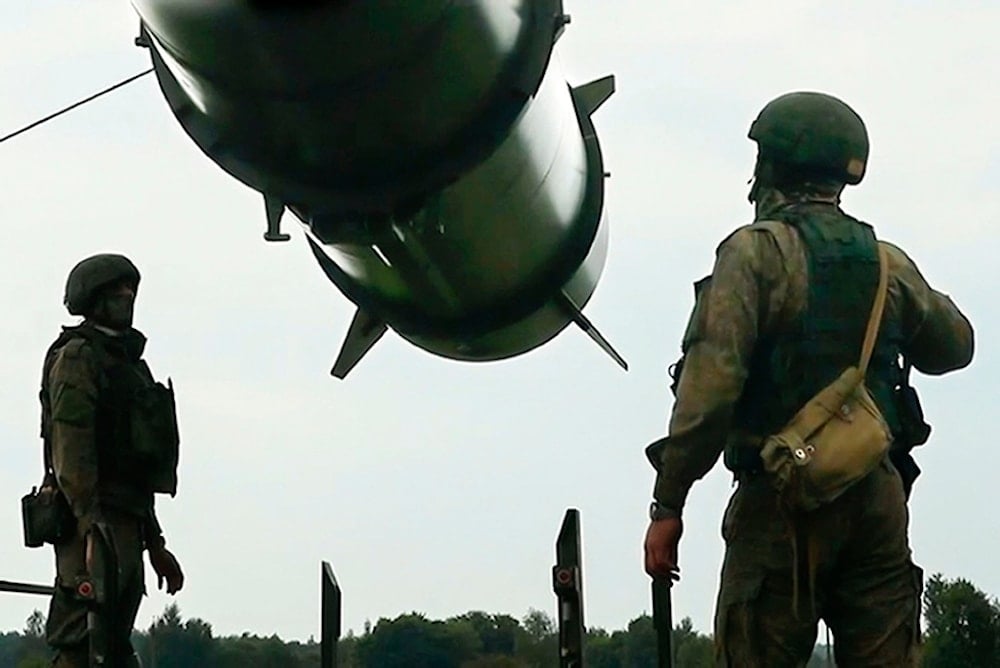Russian missiles outsmart US Patriot defenses in Ukraine: FT
Russia's upgraded Iskander and Kinzhal missiles are evading Ukraine's Patriot systems, reducing interception rates and heightening risks to infrastructure as Moscow renews its winter campaign.
-

In this photo taken from video released by the Russian Defense Ministry Press Service on Wednesday, June 12, 2024, Russian soldiers load a Iskander-M short-range ballistic missile launchers at a firing position as part of Russian military drill intended to train the troops in using tactical nuclear weapons (Russian Defense Ministry Press Service via AP, File)
The Financial Times on Thursday reported that Russia has successfully modified its missile systems to outmaneuver Ukraine's US-supplied air defenses, marking a new stage in the aerial confrontation between Moscow and Kiev.
According to Ukrainian and Western officials, months of heavy bombardments indicate that Russia has enhanced the precision and maneuverability of its ballistic and hypersonic weapons. The recent strikes that crippled Ukrainian drone production plants this summer were cited as clear evidence of Moscow's improved capability to penetrate US-made Patriot systems.
Officials said the upgrades likely involve Russia's Iskander-M launchers, which fire missiles with a range of up to 500 kilometers, and the Kinzhal air-launched ballistic missiles, capable of flying approximately 480 kilometers. The modified missiles reportedly maintain a regular flight path before sharply changing direction or descending steeply in their final moments, a move designed to "confuse and avoid" Patriot interceptors.
A former Ukrainian official described the improvement as "a game-changer for Russia." The shift, combined with delays in Kiev's receipt of interceptor missiles from the US, has allowed Moscow to destroy key military and energy facilities ahead of winter.
Faltering Kiev Defenses
Data collected by Ukraine's Air Force and reviewed by the Financial Times showed that interception rates for Russian ballistic missiles reached 37% in August, but fell sharply to 6% in September, even though the number of attacks decreased. On Wednesday, the Ukrainian military confirmed that all four Iskander-M missiles launched overnight had evaded air defenses and hit their targets.
Several facilities tied to drone manufacturing in and around Kiev were damaged in the summer strikes, officials said. Among them was a Bayraktar production site hit on August 28, where two Russian missiles also struck nearby offices, damaging premises used by the EU delegation and the British Council.
Ukraine's Patriot batteries, the only systems in its arsenal capable of downing Russian ballistic missiles, have struggled to keep up with Moscow's evolving tactics. While older cruise missiles can still be intercepted by other defenses, the recent changes have made that task increasingly difficult, officials noted.
A Western official familiar with the system's data said analysts noticed a "pattern" in which Russian missiles behaved differently during their terminal phase, swerving away from their previous engagement profiles. The shift coincided with a decline in interception success, providing the first indication of Russia's technical adjustments.
That conclusion is echoed in a US Defense Intelligence Agency report covering the period from April to June, which found that Ukrainian troops "struggled to consistently use Patriot air defense systems to protect against Moscow's ballistic missiles because of recent Russian tactical improvements, including enhancements that enable their missiles to change trajectory and perform manoeuvres rather than flying in a traditional ballistic trajectory."
The report cited a June 28 attack in which Ukraine intercepted only one of seven missiles, and a July 9 barrage, one of the largest air assaults since the start of the war, in which Ukrainian forces managed to neutralize or destroy just over half of the incoming projectiles.
Adaptability Arms Race
Officials from Ukraine and the West said Kiev shares Patriot engagement data with the Pentagon and US manufacturers, including Raytheon and Lockheed Martin, to improve system performance. Yet one official acknowledged that "those improvements often lag behind Moscow's evolving tactics."
Ukraine's First Deputy Foreign Minister Sergiy Kyslytsya told the newspaper that "the Russians continue to significantly upgrade their Iskander and other missiles' technology," urging Western allies to block the transfer of foreign-made components reaching Russia, including those funneled "via China."
Experts believe the increased efficiency of Russian missiles stems from software modifications rather than new hardware. Missile analyst Fabian Hoffmann of the University of Oslo explained that Russia, like other major powers, routinely uses real-world interception data to refine its guidance systems. "A steeper terminal trajectory — that's something you can programme in the missile," he said, noting that such maneuvers make the projectiles much harder to track and destroy.
Hoffmann described the technological race between both sides as an "adaptability game," in which each constantly revises tactics and systems to counter the other's moves.
Russia's Kinzhal missiles are launched from aircraft beyond Ukraine's defensive reach, while Iskander-M systems remain difficult to target due to their mobility. Some Patriot units have themselves been damaged after months of Russian strikes, and with other defense layers such as Iris-T systems redeployed or degraded, sources said the Patriots increasingly "have to cover themselves" during attacks.
Ukraine has not disclosed the number or deployment of its Patriot systems, but at least six batteries are known to be in service, with additional components recently provided by Germany and Norway. President Volodymyr Zelensky has appealed for at least ten complete systems to strengthen the country's defenses ahead of expected winter assaults on the power grid.
"Unfortunately, this has already become a traditional Russian tactic," Zelensky said. "Russia is once again trying to hit Ukraine with a blackout this year."
Read more: Russia expanded missile arsenal during deployment freeze: Ryabkov

 5 Min Read
5 Min Read









